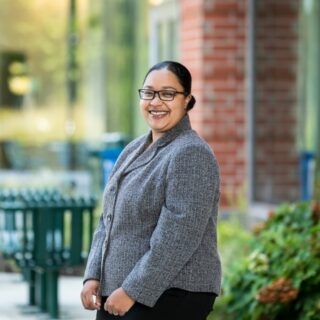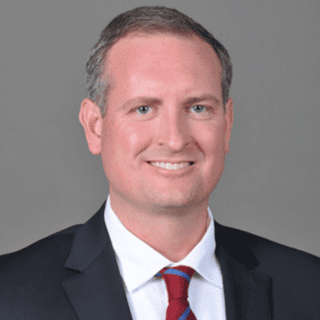
Believing in One Degree of Change
EdD alumnus helps young adults reimagine their future through the craft of boat-building
At his workplace, educator Matt Roberts (MEd ’10, EdD ’24) hears the buzz of wood saws, the sporadic thumping of hammers, and the occasional fog horn blowing in the distance.
The floor beneath his feet is swaying, too. The rocking comes from the wind and from passing boats leaving behind a choppy wake.
Roberts is program director of the Alexandria Seaport Foundation in Virginia, which is located at the McIlhenny Seaport Center on a barge on the banks of the Potomac River.
The nonprofit provides an apprenticeship in traditional boat building for 18-to-23-year olds who are disconnected from society. They are not working and are not in school. Many did not finish high school or have experienced a past trauma, have housing insecurity, or are court-involved in some way.
“We always say the woodworking and the boat building are just the vehicles for teaching them life skills and workplace skills,” Roberts said.
Roberts joined the organization in July 2025, not long after earning his Doctor in Education from the University of Pittsburgh School of Education.
He’s responsible for developing the educational curriculum for the nonprofit. The goal is to teach transferable skills and help apprentices who are struggling to get back on their feet.
“First and foremost, this is a safe place for people who have kind of been failed by the system,” Roberts said.
Charting a New Course
 Roberts had worked for 20 years as a classroom teacher at a suburban school district in the Pittsburgh area, but after the Covid pandemic was ready for a change.
Roberts had worked for 20 years as a classroom teacher at a suburban school district in the Pittsburgh area, but after the Covid pandemic was ready for a change.
The Alexandria Seaport Foundation works with up to eight apprentices at a time on a six-month cycle.
The apprentices are paid $14 per hour and work alongside a team of approximately 30 volunteers. They learn from experienced woodworkers, carpenters, boatbuilders, and mentors, while also receiving training on workplace readiness, life skills, and have the opportunity to utilize the boats they build in an on-the-water program.
The barge has a boat-building shop with the tools to create wooden flat-bottom skiffs by hand. Some are built to be sailboats and others rowboats.
“There is an entire high school curriculum in a single wooden boat,” Roberts said.
In a wooden boat, nothing is square and everything is built on a curve, he said. The math lessons encompass everything from addition and subtraction to trigonometry and advanced calculus. The science lessons include understanding the cellular biology of which woods to use. The physics lessons cover the principles of buoyancy, displacement, and force. And, finally, there are art lessons tied to the design aesthetics of the boat.
“Everything we take out on the water we build ourselves,” Roberts said.
Before building boats, the apprentices start small. They build kitchen stools, a birdhouse, and other woodworking projects. While the early creations don’t look like much, they mean a lot.
“It’s the first time in their lives that they’ve made something useful that looks good and they can take pride in that it was done with their own hands. They’re just so proud of it,” Roberts said.
In short order, the apprentices advance in their skills. After completing the apprenticeship, they are placed into jobs with a variety of local organizations. Some pursue the trades and join the carpenter’s union, but not all do.
“Our goal is to get them into good-paying jobs. We’re training them for a career,” Roberts said.
Improvement Science in Action
Roberts has applied lessons from his EdD in OSL major to his work at the nonprofit.
He uses the Improvement Science framework on a daily basis. Additionally, he took to heart the program’s emphasis on pursuing systemic change through social justice and transformative leadership.
Furthermore, it was through his dissertation in practice, which examined non-typical learning sites such as a military academy, flight school, and dental school, that Roberts first came across the Alexandria Seaport Foundation.
“We all know there are things about education that are not working. How do we be transformational?” Roberts said.
Nautical analogies are popular at the apprenticeship program.
Roberts frequently tells the apprentices that in order to “right the ship,” undertaking just one degree of change now can make a massive impact later. For example, a captain at sea who changes course by one degree may find themselves six miles away from their destination after traveling 100 miles. Across a longer voyage, the difference will be multiplied to hundreds of miles.
The same is true of apprentices who complete the program. After six months, a one-degree change may not look like much, but after a year it could result in the person now having a steady job and paying rent, when before they couldn’t. In five years, they could have a big promotion and could be buying a house.
“It was only one degree of change while here, but it amounted to a huge change five, ten years down the road.”




